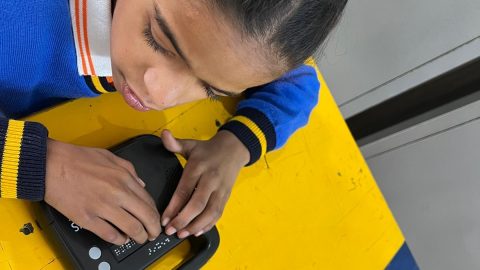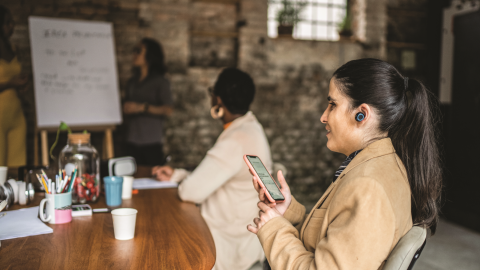Disability Policy: a bridge across the disability divide
July marks the 33rd annual Disability Pride Month, a global celebration that originated in recognition of the signing of Americans with Disabilities Act. We join disabled people and allies to focus on the progress made by the global disability community and on remaining work to address economic equity, Responsible AI and fundamental rights for people with disabilities. At Microsoft, we feel the urgency to partner to advance policy, sharing our learnings and next steps to help bridge the disability divide through policy change. Engagement with the disability community frames our approach and contributed to three new learnings:
Public-Private Partnerships Accelerate Accessibility
Our partners frequently raise the common theme of “better together.” Private-public partnerships are critical to accelerating accessibility in a meaningful way for the over one billion people with disabilities around the world, such as in employment, wages, and transportation for people with disabilities.
The U.S. Transformation to Competitive Integrated Employment Act (S.3238, H.R.2373) would end the practice of paying people with disabilities less than the minimum wage and support employers transitioning to paying competitive, fair wages. We believe in competitive integrative employment and wage equity, so we have joined the disability community in the call for Congress to end subminimum wage practices, and will be continuing to advocate for fair wages for all, as we have since 2019.
Being able to move from place to place is part of modern life; however, for many people with disabilities transportation in many countries, including the US, is inaccessible. Our employees are among the many thousands who risk safety and wellbeing or cannot safely travel. Our needs as an employer match the needs of the disability community and we will advocate for policy change to ensure everyone can travel for work, for education and for fun.
The Global Disability Community is Leading Policy Change to Protect and Advance Accessibility as a Fundamental Right
Progress is being made around the world to advance disability policy. A snapshot of that progress was on view during the 16th Session of the Conference of State Parties to the CRPD held in June in New York City. In 2006, the United Nations (UN) established the Convention on the Rights of Persons with Disabilities (CRPD) — an international treaty inspired by the Americans with Disability Act (ADA) to promote, protect, and ensure full and equal enjoyment of all human rights for persons with disabilities. We were pleased to host side events during the June Conference of States Parties tied to Microsoft’s continued efforts to partner with delegates and global disability leaders on shared goals to address the disability data gap and to integrate disability inclusion at the UN such as discussions to support physical and digital accessibility functionality.
In the European Union, work is underway to prepare for 2025 when the European Accessibility Act will be in effect. The European Disability Forum together with our teams in Brussels hosted over 1000 attendees at the European Accessibility Summit, which focused on digital accessibility, economic equity, and infrastructure accessibility. Details are now included in the European Accessibility Resource Center.
Across the globe in Kenya, Microsoft participated in the Inclusive Africa conference, which aims to advance digital accessibility and assistive technology in Africa. While there, we visited the Thika School for the Blind with inABLE where a newly upgraded computer lab is providing access to underserved communities. Connectively is foundational to ensuring disabled people have the freedom to work, learn, and interact with the world. We continue to work with the Global Hunger Project in partnership with the Federation of Disability Organizations in Malawi to bridge the disability divide for the 90% of disabled people who do not have access to the assistive devices they need, according to the World Health Organization. In rural Malawi, 5 epicenter computer labs now have accessible connectivity and devices reaching over 70,000 residents.
These are three examples just in the last month and we look forward to engaging more with you throughout the year.
Furthering the potential of Responsible AI.
Our partners are sharing their enthusiasm for the promise of next generation AI. The conversations reflect both an interest in the possibilities for use of this technology to dramatically improve accessibility, and raise considerations on how to do so responsibly. We recognize the call to action for this technology to be responsible, inclusive and accessible, and our AI principles reflect our approach to operationalize responsible practices, through policy, governance, tools, and training. The possibilities are endless when technology is inclusive, as shown by our partnerships with disability-led grantees from programs like the Accessibility Nonprofit Tech Accelerator. For example, New Disabled South is building the Plain Language Policy Dashboard to simplify complex policy issues to increase knowledge and understanding for all. Exploring the opportunities to leverage AI for how text can be converted into plain language, making the dashboard a go-to tool for people looking to understand policy, laws, and issues that affect the disabled community.
Disability Pride month is a chance to celebrate progress and recommit to the work needed to unlock opportunities in every part of society and empower people across the spectrum of disability. Thank you for your partnership as we celebrate Disability Pride Month and work toward a more accessible future. If this sparks ideas or suggestions, please contact the Disability Answer Desk aka.ms/DisabilityAnswerDesk.








